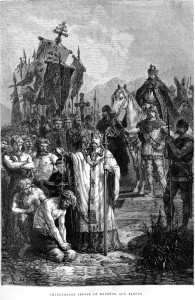Of the two women who best knew François Guizot, the first one, Pauline de Meulan, wrote to him in July 1808, even before he married her: “Your talent appears to me eminently suited to history”; that same year, they together began to work on a new edition in French of Edward Gibbon’s great book, The History of the Decline and Fall of the Roman Empire, Guizot’s first historical work when he was twenty years old. The second one, his daughter Henriette, said to him in February 1874 a few months before his death: “History is your real passion” and together they finished the fourth volume of Histoire de France racontée à mes petits-enfants, (History of France told to my grand-children), which was his last work. Guizot’s career as a historian covered more than sixty-five years, and was marked by numerous publications which were milestones, some of which retain a real scientific value, notably his Histoire de la civilisation en Europe and the Histoire de la Révolution d’Angleterre, to which can be added, on a another level, the eight volumes of the Mémoires pour servir à l’histoire de mon temps, (Memoirs to serve as a history of my time) which belong to the prestigious and very limited category of great State Memoirs, between the Testament politique (political testament) of Richelieu and the Mémoires de guerre (War Memoirs) of General de Gaulle.
Nothing predestined François Guizot to become a historian. A set of fortunate circumstances lead to him being appointed in July 1812 professor of modern history in the Paris Faculty of Humanities, a post which had not previously existed. If Gibbon’s edition, finished the same year, had introduced him to academic circles, he had not particularly studied history, which was not at that time a scholarly discipline: it was only in 1818 that Royer-Collard created the first chair of history in secondary education. But he had found his path: fifteen years later, he had become recognized as the greatest history professor and one of the best historians of his time.
